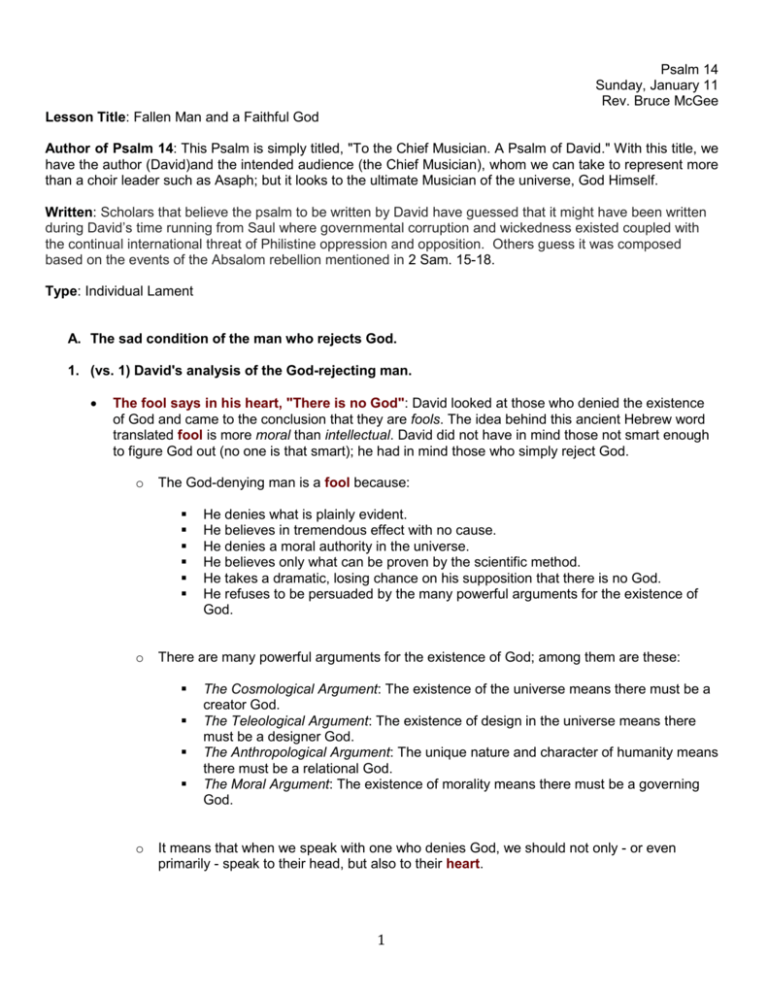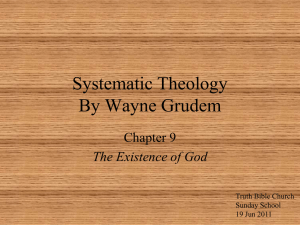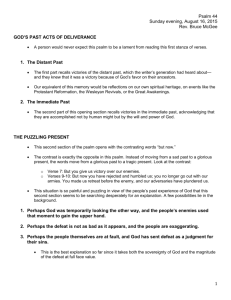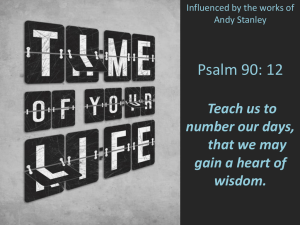Sermon Notes - Poplar Springs Baptist Church
advertisement

Psalm 14 Sunday, January 11 Rev. Bruce McGee Lesson Title: Fallen Man and a Faithful God Author of Psalm 14: This Psalm is simply titled, "To the Chief Musician. A Psalm of David." With this title, we have the author (David)and the intended audience (the Chief Musician), whom we can take to represent more than a choir leader such as Asaph; but it looks to the ultimate Musician of the universe, God Himself. Written: Scholars that believe the psalm to be written by David have guessed that it might have been written during David’s time running from Saul where governmental corruption and wickedness existed coupled with the continual international threat of Philistine oppression and opposition. Others guess it was composed based on the events of the Absalom rebellion mentioned in 2 Sam. 15-18. Type: Individual Lament A. The sad condition of the man who rejects God. 1. (vs. 1) David's analysis of the God-rejecting man. The fool says in his heart, "There is no God": David looked at those who denied the existence of God and came to the conclusion that they are fools. The idea behind this ancient Hebrew word translated fool is more moral than intellectual. David did not have in mind those not smart enough to figure God out (no one is that smart); he had in mind those who simply reject God. o The God-denying man is a fool because: o There are many powerful arguments for the existence of God; among them are these: o He denies what is plainly evident. He believes in tremendous effect with no cause. He denies a moral authority in the universe. He believes only what can be proven by the scientific method. He takes a dramatic, losing chance on his supposition that there is no God. He refuses to be persuaded by the many powerful arguments for the existence of God. The Cosmological Argument: The existence of the universe means there must be a creator God. The Teleological Argument: The existence of design in the universe means there must be a designer God. The Anthropological Argument: The unique nature and character of humanity means there must be a relational God. The Moral Argument: The existence of morality means there must be a governing God. It means that when we speak with one who denies God, we should not only - or even primarily - speak to their head, but also to their heart. 1 There is no one who does good: As David considered the sin of the God-denier, he looked out over the landscape of humanity and concluded that there is no one who does good. He did not mean that there is no human good in this world; but that fallen man is so fallen that he does not by instinct do good, and even the good he may do is tinged with evil. o o o o We are born w/ both the will & the capacity to do evil; no one has to teach a child to do bad. The path of least resistance usually leads us to bad, not good. It is often easier to encourage others to do bad, instead of good. Many of our good deeds are tinged with selfish, bad motives. 2. (vs. 2-3) Heaven's analysis of fallen humanity. The LORD looks down from heaven on the sons of men: While man may wish to forget about God, God never forgets about man. He is always observing man, looking down from heaven on the sons of men. o To see if there are any who understand, any who seek God: When God does look down from heaven, one thing He looks for is if there is any understanding or seeking among humanity. o The words remind us of God descending from heaven to observe the folly of those building the tower of Babel (Genesis 11:5) or looking down upon the wickedness of the race prior to his judgment by the flood. We deceive ourselves into thinking that man, on his own, really does seek God. Don't all the religion and rituals and practices from the beginning of time demonstrate that man does indeed seek God? Not at all. If man initiates the search then he doesn't seek the true God, the God of the Bible. Instead he seeks an idol that he makes himself. All have turned aside, they have together become corrupt: When God looks, this is what He finds. He finds that man has turned away from God, and has therefore become corrupt. B. God's defense of His righteous people. 1. (vs. 4-6) God defends the generation of the righteous. Will evildoers ever learn: David first considered the profound fallenness of man; now he deals with the fate of God's people in such a fallen world. God's people might seem like the weak fools, but David understood that it is evildoers who have no knowledge. o Spurgeon used this verse to consider the ways that Christians should stand strong though they are shamed and mocked by the evildoers. "You young men in the great firms of London, you working men that work in the factories - you are sneered at. Let them sneer. If they can sneer you out of your religion, you have not got any worth having. Remember you can be laughed into hell, but you can never be laughed out of it." (Spurgeon) 2. (vs. 7) Longing for the LORD's salvation. 2








